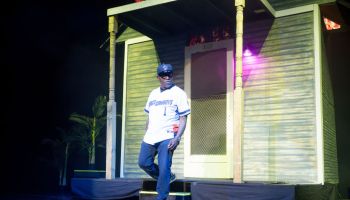Word spread fast about a certain Mr. Bernard Freeman, aka rapper Bun B, co-teaching a university course this semester with professor Anthony Pinn.
What’s so notable about that? Well, the course is Religion and Hip-Hop, something in which the Port Arthur native has an inside track, and it is being taught at Houston’s Rice University. Given the title of “Distinguished Lecturer,” Bun B is orating thanks to a program entitled Houston Enriches Rice’s Education — the HERE Program — which Pinn founded three years ago. It’s not every day that a gold-selling recording artist steps onto a collegiate campus, and it is considerably more rare to find one co-teaching a course. We sat down to chat with Pinn and Bun B about the class, how it came to be, and their experience thus far. The genial pair — respectively referring to each other as “Doc” and “Prof” — was more than happy to answer our queries.
29-95: Dr. Pinn, Bun B had been a guest lecturer in your course back in 2009. What made you initially select him?
PINN: Well, I’ve been teaching this course off and on for 15 years. I was talking with one of my graduate students, Andrea Matthews, and telling her that I was really interested in making certain that we gave proper respect and attention to the hip-hop scene in Houston; it’s been significant. We were talking about possibilities, and Prof’s name came up, and for me it made perfect sense. He’s extremely gifted as an artist, extremely thoughtful — what better way to launch that connection between hip-hop and religion, the city of Houston and Rice University?
29-95: How did the HERE Program come about, and how long has it been in place?
PINN: We’ve been operating for roughly three years. For me it was a way to respond to our [university] president’s Vision for the Second Century. That vision includes a call for greater interactions between Rice and the larger Houston community. From my perspective, that kind of interaction had to involve not only Rice going off-campus, but Houston coming on-campus; that Rice had an obligation to recognize the wealth of talent, of capability, the rich historical & cultural history of Houston, and use that both to re-think how we do research and how we teach.
29-95: Bun, what drew you to this course initially?
BUN: I think the timing was key in the whole sense of this. During the incarceration of (UGK partner) Pimp C, I found myself at a very dire crossroads. … My foundation had always been the group UGK, and I had always been able to fall back on that. When Pimp C got incarcerated, it’s not that we’d broken up, but the group — as far as being able to record and perform — ceased to exist. I had to find a different foundation, and my wife said, “At this point in your life, you don’t want to reach for anything but (something that’s) spiritual.”
It wasn’t until I gave myself over to Christian law that I started to see changes in my life and in my career. The more I was able to incorporate Christ into my life personally was starting to have an effect on how I was able to rebuild and reconstruct myself personally. Having this spiritual awakening happening at the same time I was being asked to speak at a course like this — it just kind of started setting off some things.
We’ve only gotten positive reception from people. This course has become something that will be just as profound on my professional résumé as any music that I have recorded, because now I have a definite way to express what I meant and the conditions under which I created the music – and also how it relates to me in a very real and spiritual way.
29-95: How many students do you have in the course?
PINN: It gets a little tricky because we’re still in the add/drop period, but we have roughly 245. It’s offered on two levels — a 100-level & 300-level. They sit in the same room.
BUN: [300-level] students have extended reading and discussion that they have to be prepared for, but we don’t teach two different classes because the information that we give is necessary for both.
29-95: What sort of kids take Religion and Hip-Hop here at Rice?
PINN: It’s been very interesting. In terms of undergraduate population, we have every division of education represented — folks from the natural sciences, engineering, humanities, social sciences, the business school. The interest has really cut across the university in significant ways. In terms of diversity, the course also reflects deep diversity — a variety of life experiences represented here, economic diversity, racial diversity. It’s a nice setup.
29-95: Do you meet weekly to prepare for the course?
BUN Doc and I have actually refrained from going over anything that we discuss before class. That way any interpretation that I may have, or what he speaks on, is purely organic. It’s right there on the spot, something that I’m feeling, as opposed to what I feel based upon what he’s teaching, and vice-versa.
PINN: So there’s a nice flow.
BUN: I think coming across as too prepared would take away from the class, quite frankly.
29-95: You’d like it to have that back-and-forth…
BUN: Yes, because religion and hip-hop have that kind of dialogue, with each other, with the listener.
PINN: We do the prep and then allow the conversation to develop naturally.
29-95: Has the dynamic of the course changed at all since you’ve brought Bun in to co-teach, as opposed to previous iterations of the course?
PINN: It has a certain type of thickness now; (in me) the students get information from someone who thinks about the connection between religion and hip-hop. With Prof, they get someone who thinks about it but also someone who can share insider information concerning how these interactions are lived. So this way they get a much richer sense of how the connections between religion and hip-hop are both thought and practiced.
BUN: We’ve even had the students say that it’s the lack of academia accredited to me that gives the class its richness. It’s easy for someone to think about what the connection is, but when you have someone that can actually speak to the connection and give you personal examples within themselves & the music, it just adds that much more to the class.
29-95 Bun, are you currently writing anything, and has this affected your writing at all?
BUN: Not yet, so as far as the direction of my next full project, it hasn’t really taken on shape and form. I think that there’s a lot that I can take from this course that I’ll be able to incorporate into the music — not to say that my next album will be called “Religion and Hip-Hop” or that it’s going to be that kind of a balance. But there are going to be life lessons that I’ll learn during the course of this class that I’ll be able to attribute to music — and again, to show the connection between religion and hip-hop through execution and reason.
29-95 You’ve taken on the affectionate nickname Professor Trill — how does religion relate into “trillness,” if you will?
BUN: I think it’s about being honest with yourself. When a person has really set (himself) up to be perfectly honest with (himself), that usually comes with some kind of religious experience or spiritual awakening. It’s like, ‘You know what, this is the new me. This is who I am. I’m not going to make apologies for it, and this is the attitude I’m going to carry forth.’ That itself is a reflection of religious experience, and to me that kind of encapsulates what being “trill” is.
Being “trill” by definition, as far as I’m concerned, is about the way you carry yourself with other people, the way you execute things in life, the way you handle circumstances. A lot of the way that comes into people’s lives is based on their spirituality and their religious connections. … For me it reinforces what “trill” is.
PINN: There’s a shared vocabulary, right? The folks who practice religion and study religion are also concerned with formulations of what’s true and what’s real.
BUN: Absolutely — and hence, what’s “trill.”
Via: http://www.29-95.com











